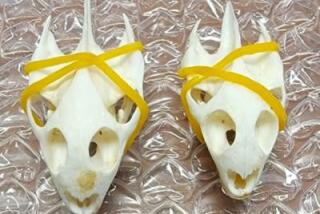Chinese authorities recover $48 million worth of smuggled python skin
- Share via
reporting from BEIJING — Chinese authorities have recovered a massive haul of smuggled python skin worth $48 million, Chinese media reported on Monday, highlighting the scope of an international black market trade in the scaly, patterned material.
Customs agents in Haikou, a port city in China’s southern island province Hainan, recovered 68,000 python skins on Friday, according to a report by the official Legal Daily news service.
The smugglers claimed that the skins would be used to create traditional Chinese musical instruments.
Pictures online showed uniformed agents rolling out endless rows of elaborately patterned skins, many as long as mid-sized sedans. The report did not detail how the skins were discovered.
The Legal Daily also detailed a sting on Jan. 29, in which authorities arrested 16 people across five cities in southern China’s Hainan, Jiangsu, Fujian and Guangxi provinces for smuggling python skins.
The state-run Shanghai Daily newspaper described the operation, which involved 80 police officers, as the “largest-ever python skin smuggling case.”
European and U.S. appetites for python leather products — especially high-end handbags and shoes — have grown in recent years, spurring an international black market trade that could be worth as much as $1 billion annually, according to a 2012 report by the International Trade Center, a subsidiary of the World Trade Organization.
See more of our top stories on Facebook >>
Pythons, a family of non-venomous snake species, live across Asia, Australia and Africa. One species, the Indian python, is considered “threatened with extinction” by the Convention on International Trade in Endangered Species of Wild Fauna and Flora.
The convention permits a limited international trade in python products, but only under a set of detailed regulations intended to protect wild populations. Yet according to the International Trade Center, enforcement is patchy and regulations are often flouted, putting other python species at risk of overhunting.
The Legal Daily said that the Hainan-based company behind the smuggling operation possessed an import license but falsely reported the skins’ value, allowing it to evade $1.7 million in taxes.
The company has been charged with “smuggling ordinary goods” and “smuggling rare animals and [rare animal] products,” according to the report.
At least one suspect confessed that since 2014, the company collaborated with “overseas companies” and “Vietnamese agents” to illegally import 42,000 python skins and 8,000 python eggs using fake customs declaration forms. The articles did not specify the eggs’ intended use.
“Last January, by analyzing all the information we gathered, we found that the Hainan animal importing company [underreported] prices of imported Vietnamese python skins,” Yang Ganlin, deputy head of Haikou customs’ anti-smuggling department, told the news service. “The company is suspected of smuggling underpriced python skins.”
Yingzhi Yang in the Times’ Beijing bureau contributed to this report.
ALSO
China made 85 billion sanitary pads last year, and not one tampon. Here’s why
For Chinese visiting Japan, bargains make it easier to overlook nations’ ill feelings
A year later, Afghans reflect on a mob lynching of a woman falsely accused of burning Koran
More to Read
Sign up for Essential California
The most important California stories and recommendations in your inbox every morning.
You may occasionally receive promotional content from the Los Angeles Times.













